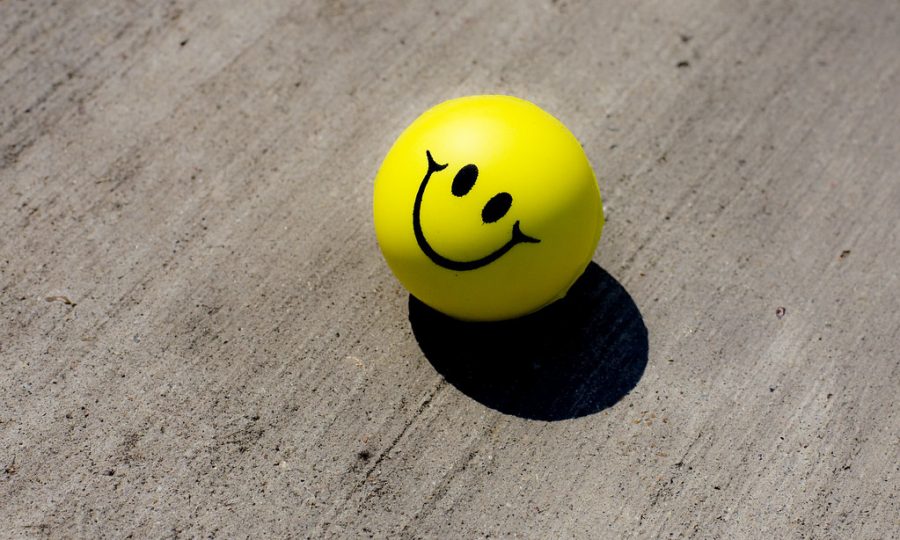Column: Toxic positivity brings more negativity during the pandemic
“smiley face stress ball” by jetheriot is licensed under CC BY 2.0
During the pandemic, it is important to process all emotions, both positive and negative.
February 19, 2021
2020’s been a dumpster fire for just about everyone, and 2021 hasn’t been all that great either. There’s no avoiding it — things kind of suck right now.
Stop being so negative! There have been so many good things to come out of quarantine! Look at all the new hobbies you picked up!
What the hell am I going on about, you ask? Let’s start with a definition: Toxic positivity is, according to the Psychology Group, “the overgeneralization of a happy, optimistic state that results in the denial, minimization and invalidation of the authentic human emotional experience.”
So, while there may be a “silver lining” to everything, it’s not always relevant. Looking at the “bright side” of things all the time gives you an excuse to suppress negative feelings — which can lead to even more of those feelings.
When other people tell you to be more positive, it can make you feel shame or guilt for having negative feelings, leading you to hide them in front of those who don’t want to see any negativity. When you internalize toxic positivity, it can cause you to dismiss your feelings and push them away instead of dealing with them in a constructive way. Studies show that denying feelings triggers physiological responses to stress, as well as increased difficulty in avoiding distressing thoughts and feelings.
That means it’s important to process emotions — positive and negative — in order to lead a healthy life. We need negative emotions to fully comprehend our experiences, and doing so allows us to make meaning out of our lives. As suppressing emotions actually leads to thinking about them more, the only way to make them go away is to stop suppressing them.
As with everything else, the first step is always to acknowledge your feelings and problems. That’s the only way you can successfully cope with everything that’s going on right now.
During this time, social media certainly doesn’t help. It can be so easy to fall down the rabbit hole of watching productive and successful celebrities on Instagram and Twitter, which will inevitably make yourself feel worse and worse as you compare your own life to theirs. I would argue it’s never good to compare yourselves to others. Even if you aren’t doing something as spectacular as what you see others doing online, you have to remember that social media never gives you the full picture. You never really fully know what is going on behind those photos. This sentiment is especially true during the pandemic.
Listening to people who say that quarantine is the best thing that’s ever happened to them will only make you feel bad for ostensibly not doing enough to enjoy it. The COVID-19 pandemic has been hard on all of us. A Center For Disease Control and Prevention study found that two in five Americans experienced pandemic-related mental or behavioral health problems. For those who fall in that category, being force-fed positivity isn’t going to make anything better.
It doesn’t benefit anyone when some use social media to spread “good vibes only” when there’s a lot more to talk about than that. It’s like the Arab proverb that says: “Sunshine all the time makes a desert.” Trying to be positive all the time isn’t healthy, and we need to be able to process negative feelings comfortably without being pressured to be more positive.
Yes, there’s a lot we can do to take advantage of the pandemic. Furthermore, many of us have a lot to be grateful for, and gratefulness can be the key to happiness — here’s a fabulous TedTalk on why. Several studies have also shown that positive thinking has numerous health benefits. However, I’m just pointing out that positivity shouldn’t prevent you from dealing with all of your emotions, especially the negative ones.
We all have to be more open to the full spectrum of human emotion. That means we have to accept those feelings when they come from within, and when we’re trying to help and support others. The only person who really knows what you’re feeling is you, so you have to take charge of processing them — yes, all of them — without succumbing to toxic positivity.
Mia Merchant is a first-year in the Explore Program. She can be reached at merchant.mia@northeastern.edu.







